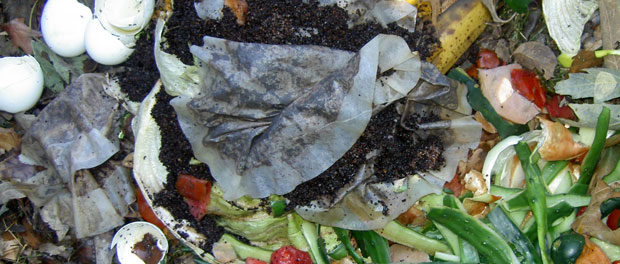 Last year, we acquired a large compost bin to dispose of many of our leaves, weeds, and food waste. Our backyard compost bin is smelly. It’s stinky. In the spring, I placed the bin a few steps from the back door, with the thought that I’d be more motivated to throw away every eggshell and potato peel if it were nearby. Fast-forward to late summer, and the location made sitting outdoors unpleasant. The pungent odors of decaying vegetable matter did not go well with strawberries and tea on the back porch. We moved the bin further away, close enough to access, but not so close to prevent enjoying the rest of the yard.
Last year, we acquired a large compost bin to dispose of many of our leaves, weeds, and food waste. Our backyard compost bin is smelly. It’s stinky. In the spring, I placed the bin a few steps from the back door, with the thought that I’d be more motivated to throw away every eggshell and potato peel if it were nearby. Fast-forward to late summer, and the location made sitting outdoors unpleasant. The pungent odors of decaying vegetable matter did not go well with strawberries and tea on the back porch. We moved the bin further away, close enough to access, but not so close to prevent enjoying the rest of the yard.
Still, the compost is rich and full of nutrients. It’s amazing that what starts as weeds and garbage can be transformed into life-giving food for plants in the next round of growth. Sin and suffering are like the weeds and the waste that go into compost. Both are capable of being transformed by God into something new and fertile.
I’ve been reading Dorothy Day’s House of Hospitality. In one passage, she tells of a woman screaming in a nearby tenement building. The neighbors wonder at the cause: is the woman giving birth? Drunk? Insane? But they do nothing, just wanting to go back to sleep. Day then recalls being out with a friend as a young girl, when an angry dog attacked them and tore their clothes into ribbons. She writes, “I remember how people witnessing this miserable sight, in their own fear, had not come out to help. We welcomed the policeman who rescued us and I could have kissed his hands with gratitude…Why didn’t someone call the police now?”
Dorothy Day did not ignore human need. She devoted her life to standing in solidarity with the poor and developing houses of hospitality. It’s clear that much of her great reservoir of energy for this work drew upon her own past experiences of suffering—not only dog attacks but also losses such as being abandoned by her longtime lover, who left her when she became pregnant and converted to Catholicism. Such experiences seem to have deepened Day’s capacity to engage with poverty and loneliness in others.
In St. Ignatius’s Spiritual Exercises, the movement from Week Three to Week Four is a movement from the cross to the Resurrection, from suffering and death to new life. In my experience, it’s not so much that God removes suffering, as though it had never occurred. Our pasts remain a part of our identities. Jesus himself still bears the bodily marks of his Crucifixion. Day’s personal history informed her post-conversion work.
God takes the difficult material of our lives and makes it capable of bearing fruit. We may want to keep the sinful, broken, “smelly” places of our lives far away—and surely God wants us to enjoy the blossoming gardens and not to remain in darkness. But the compost in the corner has its place, too. God takes all and transforms all—even the “garbage”—into new life.

Thanks, RM and Peter, for both of those insights!
I like to think of the compost bin in terms of death and resurrection. Remember the grain of wheat which Our Lord reminded must die to produce a crop for next year.
Thank you Professor,
You inspired me to contemplate methods for feeding or harvesting compost. Smelly compost may be too rich, may not get enough air, or it may be too wet or even mixed with dairy! Balance and manage your compost. Help God along.
Wonderful reflection, Marina. It brought to mind that, years ago, as I approached my 40th birthday, my family asked what I might like for that significant birthday. I asked for a tumbling compost bin, and though puzzled, they chipped in and bought one for me. From the distance of a number of years, I realize I was also beginning to do some inner work at that point in my life and the lesson of both the composter and the counseling seemed to be, “Maybe life can make something good out of the messes I had heretofore tried to keep out of sight and out of mind.” God truly does “take the difficult material of our lives and make it capable of bearing good fruit.” My garden and my heart both attest to that.
Thanks for sharing. Peace.